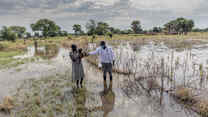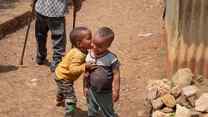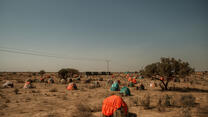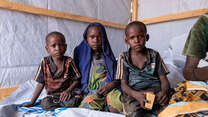
Access to clean water, proper sanitation and hygiene (WASH) are essential human rights. However, an alarming 785 million people across the globe use unsafe drinking water, while almost 2.4 billion people do not have access to basic sanitation facilities.
Humanitarian assistance organisations regularly use the acronym “WASH”, which stands for water, sanitation and hygiene, to refer to these necessities.
The International Rescue Committee (IRC) emphasises the urgent need to address the barriers that prevent vulnerable communities around the world from accessing WASH services.
Inadequate access to clean water, proper sanitation facilities and good hygiene practices can result in adverse outcomes. People living in areas with poor WASH conditions are more likely to experience health problems such as diarrheal diseases, respiratory infections and typhoid fever. Additionally, children may suffer from acute malnutrition, which can lead to stunted growth and developmental delays.
Poor WASH conditions can also negatively impact access to education. Children, especially girls, may miss school due to the need to fetch water for their families. These absences can impede their learning and have long-term effects on their future prospects.
Addressing WASH challenges is crucial for promoting health, nutrition, education and for improving the quality of life in communities. Governments, non-governmental organisations and individuals must work together to ensure people can access WASH practices.
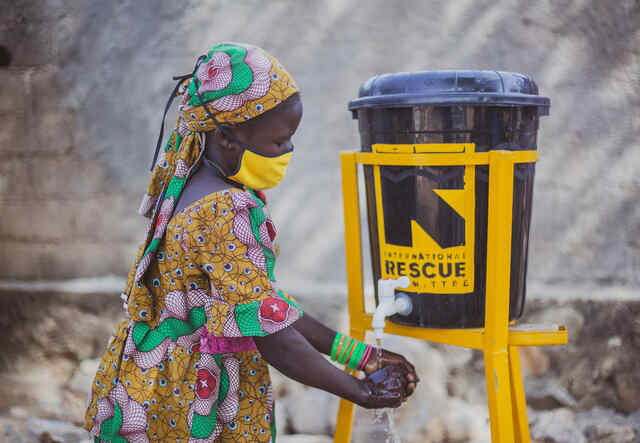
Why is WASH important for health?
Disease and infection spread quickly in communities without access to WASH services. The absence of safe drinking water increases the spread of waterborne diseases like cholera, diarrhea and typhoid. Inadequate sanitation practices, including the lack of toilets and sewage systems, contaminate the environment and water sources, increasing the prevalence of diseases like dysentery and hepatitis A.
Poor hygiene practices, such as improper handwashing, contribute to the spread of infections. Additionally, the lack of access to clean water for hygiene and food preparation can lead to foodborne illnesses and malnutrition, especially in children.
WASH-associated diseases constitute a significant cause of child mortality worldwide, with diarrhea alone being one of the leading causes of death among children under 5. Inadequate WASH facilities during childbirth can increase the risk of infections and complications for mothers and newborns.
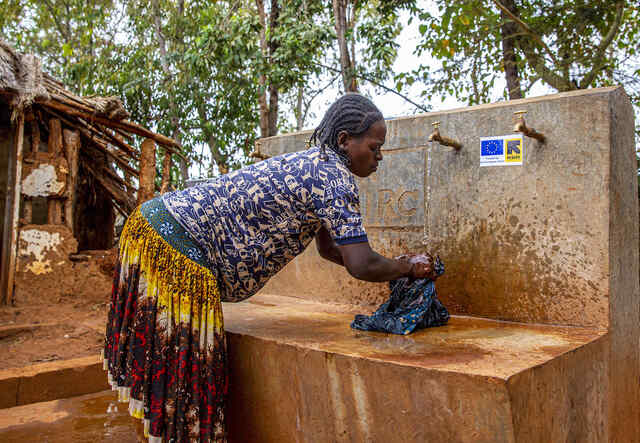
Moreover, healthcare facilities that lack proper WASH infrastructure may become breeding grounds for infections, compromising the quality of care and putting patients at risk.
Ultimately, the absence of WASH services jeopardises public health and decreases productivity and well-being, as people spend more time seeking water or recovering from illnesses.
How is WASH a gender issue?
Water, sanitation, and hygiene (WASH) are crucial in ensuring women and girls' health, safety and well-being. Unfortunately, they often suffer the most from lacking access to these basic services. Women and girls are usually responsible for collecting water, which can be a time-consuming and physically demanding task, taking away from their educational and economic opportunities.
Nahar* (pictured below) is a 28-year housewife living in the coastal area of Rangabali, Patuakhali, Bangladesh. Living in a disaster-prone area makes her life difficult.
Nahar, and other women in her community, regularly walk kilometres to collect safe drinking water. Families in the area rely on dirty water from canals for daily household chores, including bathing and dishwashing.
Feminine hygiene, especially menstrual management, has been a huge challenge for Nahar. Sometimes Nahar takes birth control pills to delay her menstruation because of the lack of clean water.
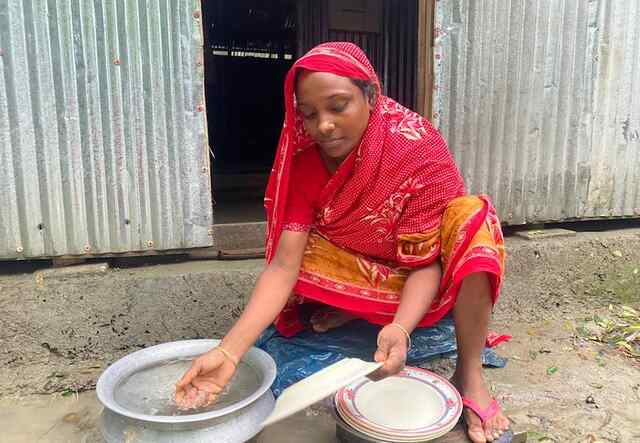
“Cyclone is the main disaster here, and unfortunately, it has happened, causing damage to our house's sanitation system for several days. During this time, it is very uncomfortable to manage menstruation”, she explains.
Inadequate WASH services put women and girls at a greater risk of abuse, illness and infection, particularly during menstruation and childbirth. Due to the lack of proper WASH facilities, many women and girls have to resort to unhygienic and unsafe methods of managing their menstrual cycles, which can lead to infections and other health issues. The absence of WASH facilities in schools can further perpetuate educational gender disparities, as girls may miss classes during their periods.
The lack of private and secure latrines further complicates women’s lives. Without proper sanitation facilities, women and girls are forced to use open fields or bushes, which exposes them to various health and safety risks. It also leaves them vulnerable to harassment and assault, particularly at night.
Addressing WASH issues is critical for improving women and girls' health and safety, promoting gender equity and empowering them in various aspects of life.
Lack of access to WASH can impact children
The fundamental right to safe drinking water and sanitation is necessary for a child's survival. Unfortunately, children in regions grappling with prolonged crises and conflicts, such as Cox's Bazar, Ukraine, and Yemen are denied these basic rights.
Fragile and conflict-affected areas often lack access to safe water due to damaged infrastructure, deteriorating pipelines and dangerous water collection methods. This results in the spread of disease and disruptions to schools and hospitals.
Limited access to clean water is triggering social, economic, and political instability. This instability poses severe threats to the survival, health, and development of children and their communities and peace and development on a broader scale.
About 800 million children live in fragile and conflict-affected settings, with one in ten living in extremely fragile conditions. Children under 15 are nearly three times more likely to die from water and sanitation-related diseases.
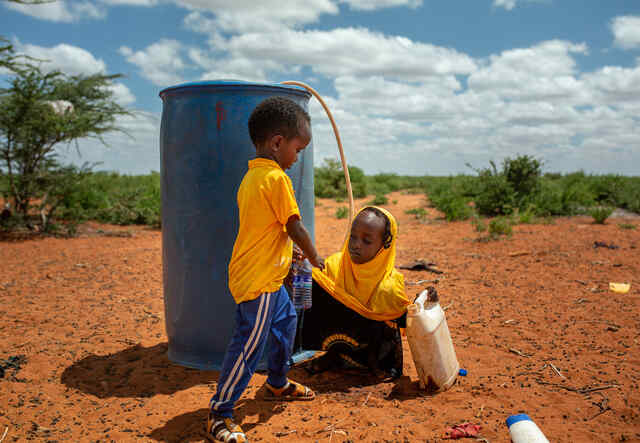
Barriers to education
Access to clean water, sanitation, and hygiene (WASH) facilities in schools improves health, gender equity and quality of learning outcomes and also boosts student attendance rates.
Contrarily, inadequate WASH facilities in schools can lead to frequent absenteeism, especially among girls who may miss school to collect water for their families due to a lack of proper menstrual hygiene management.
Girls must have access to private and hygienic sanitation facilities. A clean and hygienic school environment enhances the effectiveness of learning and contributes to higher student retention rates, particularly in vulnerable communities.
How does WASH impact nutrition?
Water, sanitation, and hygiene (WASH) can directly impact nutrition. Access to safe drinking water is fundamental, as contaminated water can lead to waterborne diseases, causing nutrient loss and malnutrition, especially in children. Proper sanitation and hygiene practices prevent disease transmission while inadequate sanitation can increase the risk of infections that affect nutritional status.
Clean water is vital for food preparation, and poor hygiene can lead to reduced food intake due to food safety concerns. Maintaining hygiene during breastfeeding is crucial for infants' health and nutrition. Repeated illnesses from inadequate WASH conditions can hinder child growth and development. Hygienic healthcare facilities are vital for treating malnourished individuals, as poor WASH services can lead to healthcare-associated infections that further compromise nutritional status.
In Somalia, families are currently facing a catastrophic food crisis. This results from a severe and prolonged drought and decades of conflict that have destroyed crop production and made it almost impossible for herders to find food for their animals.
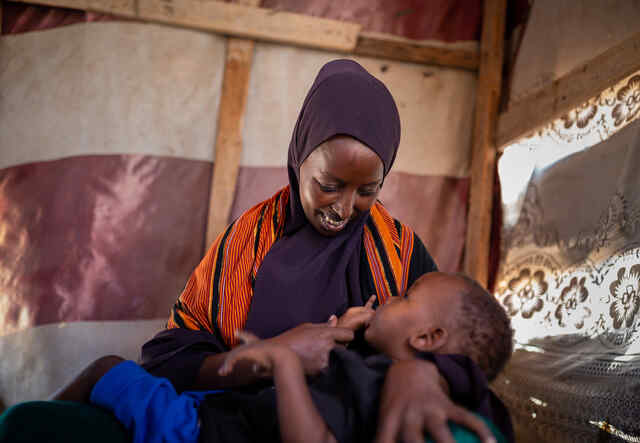
Halima*, a mother, and her husband used to store the produce from the rainy season for future use. However, due to the drought that devastated their crops, they are facing barriers to providing enough food for their family.
The prolonged drought has made it harder for families like Halima's to find clean and safe water sources. The IRC built four water points (kiosks) and a 2000-metre pipeline extension in the Arlaadi camp to address this issue. These kiosks provide free access to safe and equitable drinking water. With this clean water, Halima and her family can drink, cook and bathe without worry.
“Before the IRC brought the water, the condition of our children was bad. Their skins were cracked - dirt covered their bodies. We did not have water to bathe them. Now, our children’s skin is shining, healthy and beautiful.”
Halima dreams of a future where her children have access to nutritious meals, quality education and opportunities to thrive despite their hardships. “I would love for my kids to make progress in education and get the necessary food to allow them to go to school. They can’t get an education while they are hungry.”
The IRC's response to the WASH crisis
The International Rescue Committee (IRC) recognises the pressing need to address the Water, Sanitation, and Hygiene (WASH) crisis and has established a dedicated Environmental Health (EH) team to combat WASH-related diseases. Our multifaceted approach encompasses emergency response, community and government engagement, human-centred design, hygiene promotion and ensures access to essential services.
The IRC acts swiftly in acute emergencies by initiating WASH programmes, providing life-saving water, sanitation, and hygiene services to affected communities. We collaborate with local partners to establish essential water and sanitation facilities, exemplifying the critical nature of these interventions.
Transitioning from emergencies to recovery, the IRC empowers communities and governments to oversee improved WASH services and system maintenance. Partnerships with communities on climate change and disaster risk management ensure the availability of resources for survival in a changing world.
The IRC's EH programmes actively promote safe hygiene practices, reaching over three million people annually through mass media and direct community engagement with hygiene promotion. This includes vital practices such as supporting handwashing and disinfection practices by providing basic hygiene supplies and cash vouchers, proper waste disposal, safe water management and menstrual hygiene management.
Support IRC’s WASH efforts around the world
Millions of families are affected yearly by lack of access to clean water, sanitation and hygiene. Organisations like the IRC respond to the immediate needs of these communities and help them on their road to recovery
Donate to the IRC to support our work in more than 50 countries around the world.
*Last name omitted for privacy
